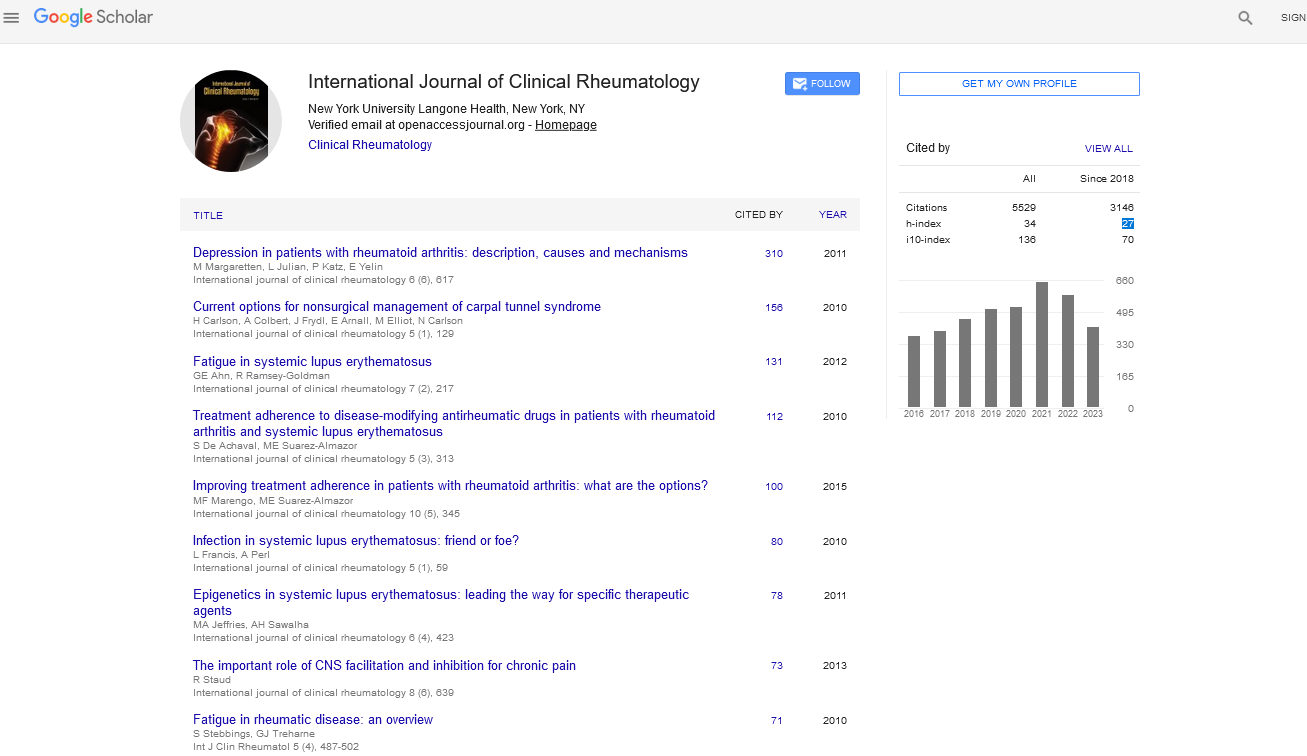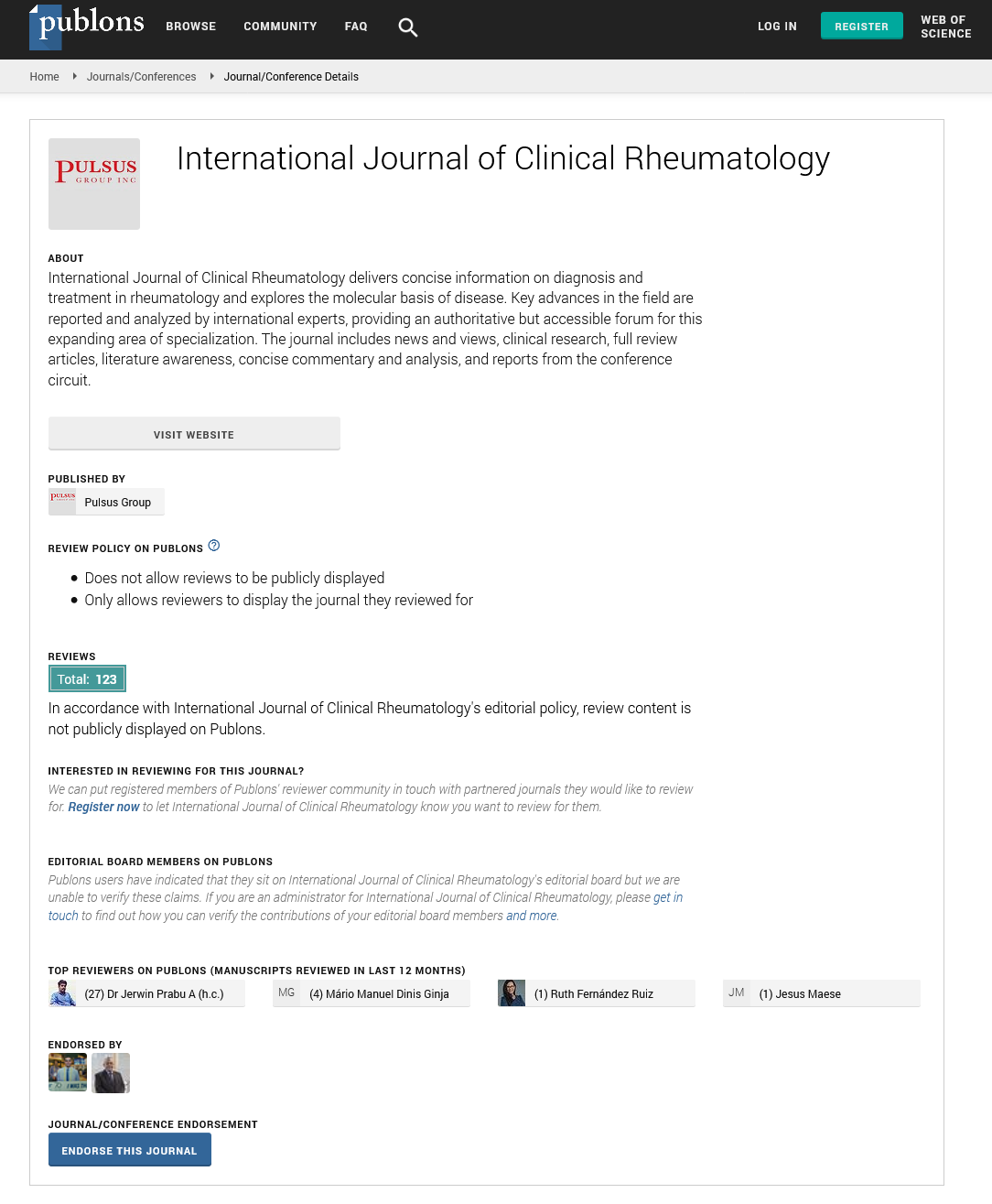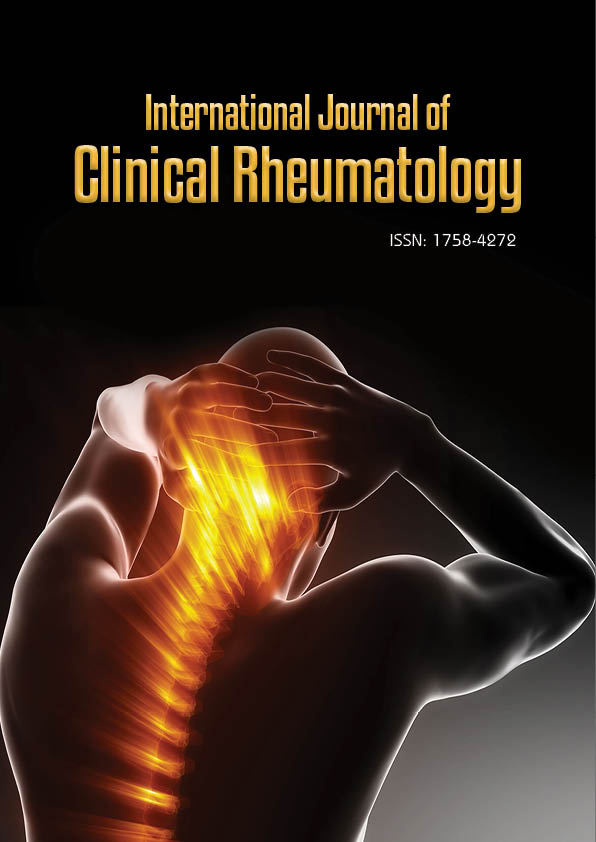Research Article - International Journal of Clinical Rheumatology (2024) Volume 19, Issue 1
Evusheld efficacy and safety in autoimmune rheumatic diseases treated by B-cell depleting therapy: a prospective observational trial
Lisa Kaly1,2*, Mark Volevich1, Shiri Keret,1, Abid Awisat1, Aniela Shoval1, Itzhak Rosner1,2, Michael Rozenbaum1,2, Nina Boulman1,2, Emilia Hardak3,2 , Gleb Slobodin1,2 and Doron Rimar1,2
1Rheumatology Unit, Bnai Zion Medical Center, Haifa, Israel
2Faculty of Medicine, Technion, Haifa, Israel
3Pulmonary Unit, Bnai Zion Medical Center, Israel
- *Corresponding Author:
- Lisa Kaly
Rheumatology Unit, Bnai Zion Medical Center, Haifa, Israel
E-mail: lisakaly@yahoo.fr
Abstract
Background: B cell depleting therapy (rituximab) results in impaired ability to mount a humoral immune response. Evusheld, tixagevimab 150 mg co-packaged with cilgavimab 150 mg, is a passive vaccine against SARS-CoV-2.
Objective: Evaluate prospectively the efficacy and safety of Evusheld vaccine for preventing or mitigating SARS-COV2 infection in patients with autoimmune rheumatic diseases (AIRD) treated with rituximab.
Methods: We compared patients treated with rituximab, who agreed to receive Evusheld, to patients who refused. The primary outcome was the risk of severe COVID19 infection from omicron variant.
Results: 45 AIRD patients in the intervention group and 26 in the control group were recruited. There was no difference between the groups with regard to sex, age, and years of rituximab treatment, previous mRNA vaccination and serum immunoglobulins level. No difference in the infection rate was found between intervention group and control group (21 (49%) versus 12 (48%). Four patients had a severe infection, 3 in the control group and 1 in the intervention group. Evusheld reduced the risk for severe infection by 94% (HR 0.06, 95% CI 0.01-0.76, p-value 0.017). No adverse events were reported.
Conclusions: Evusheld decreased the risk for severe COVID19 infection in patients with AIRD treated with rituximab in a period in which Omicron BA.5, BQ1 and BQ.1.1 variants were prevalent in Israel, with a favorable safety profile.
Keywords:
Evusheld; COVID-19 infection; B-Cell depletion therapy; Autoimmune rheumatic disease
Key messages
•Evusheld decreased the risk for severe COVID19 infection in patients treated with rituximab
•Evusheld did not reduce the rate of SARS cov-2 infection in this patient population
Introduction
Humoral immunity is a major component of the adaptive immune response against viruses and bacteria. B cell depleting therapy (rituximab) is broadly used for the treatment of various autoimmune rheumatic diseases (AIRD). It results in a significant transient decrease in CD20 B-cells and impairs the ability to mount a humoral immune response to infection [1]. Despite optimal SARS-CoV2 mRNA vaccination the immunogenicity of vaccines was found to be suboptimal in patients treated with rituximab mostly in the first 6 months after treatment and up to 1 year [2].
Evusheld, tixagevimab co-packaged with cilgavimab, is a passive vaccine that is based on human monoclonal antibodies that bind to distinct sites on the SARS-CoV-2 spike protein. It results in sustained, anti-SARS-CoV-2 antibodies levels that may last over 6 months. Evusheld was evaluated in a phase 3 study between November 2020 and March 2021, in a period in which Omicron and its BA.1 sublineage were prevalent [3]. Most of the published data on Evusheld is related to hemato-oncological patients treated with rituximab, who differ biologically from patients with AIRD. The aim of our study was to evaluate the efficacy of Evusheld in patients with AIRD who were treated with rituximab.
Patients and Methods
Study population
We evaluated prospectively all AIRD patients above 18 years old, who were treated with rituximab or AHSCT between March 1st 2022 and February 23rd 2023) in our institution (Bnai Zion Medical Center) and affiliated rheumatologic clinics. All patients were advised to be vaccinated with 300 mg of Evusheld (150 mg of tixagevimab and 150 mg of cilgavimab) and since July 2022 the recommended dose was increased to 600 mg (300 mg of tixagevimab and 300 mg of cilgavimab) every 6 months according to the Israeli Ministry of Health recommendations. Patients who were willing to receive the vaccination were considered the intervention group and those who refused were included in the control group. The study was approved by the local Helsinki committee. All the patients signed the informed consent.
Primary endpoint
The primary endpoints were:
•The rate of covid-19 infections
•The rate of severe COVID19 infection.
Covid-19 infection was defined as having respiratory symptoms and/or flu-like symptoms with positive PCR test.
Severe Covid-19 infection was defined by any of the following: pneumonia, hospitalization or death related to Covid-19 infection.
Secondary endpoint
The secondary endpoint was the rate of moderate or severe adverse events after Evusheld injections.
Data collection: Demographic and clinical data were collected by frontal interview and from patients’ files. Patients were instructed to have a PCR test in case of an upper respiratory infection and to report any COVID-19 infection during a 6 month follow up period after their recruitment. We contacted every patient at the end of the study period after 6 months to actively verify whether they had an infection that was not reported. Adverse events after tixagevimab/cilgavimab were evaluated by a phone call 2 days after vaccination.
Statistical analysis: Patients' characteristics were presented as mean (SD) for continuous variables or by count (percent) for categorical variables. Univariate Cox regression was performed to reveal potential confounders that were subsequently evaluated in the multivariate Cox regression analysis. We calculated the attributable risk of severe Covid19 disease for the control group among infected patients. The P-value was considered significant if lower than 0.05. Statistical analysis was performed using R Statistical Software (v4.1.2; R Core Team 2021).
Results
Seventy-one patients were included in the study, 45 patients in the intervention group and 26 in the control group. There most frequent AIRD among the enrolled patients were rheumatoid arthritis, 28 patients (39%) and systemic sclerosis, 27 (38%). There was no difference between the groups regarding sex (females 89% versus 77%, p-value 0.2), or age (59 ± 12 years versus 55 ± 15 years versus, p-value 0.5), Table 1. Mean time of follow-up was similar between the intervention and control group (19 ± 10 weeks versus 25 ± 7 weeks respectively, p-value 0.054). There was no statistical difference between the groups regarding globulin serum level, years of treatment with rituximab, and number of previous mRNA vaccination in descriptive statistics and in the univariate cox regression model (Table 2). 68 patients among 71 had available data for Covid19 infection: 33 (48%) were infected with Covid19 during 6 months of follow-up. No difference in the infection rate was found between the intervention and control groups, 21 (49%) versus 12 (48%), respectively. Among 33 COVID19-infected patients, 30 were retained for further analysis (3 patients had missing data concerning the date for the event). Overall, there were 4 patients with severe infection, 3 in the control group and one in the intervention group (p-value 0.052). The 3 cases with severe Covid-19 infection in the control group included one death, one hospitalization, and one Covid-19 pneumonia. Evusheld reduced the risk for severe infection by 91% (HR 0.09, 95% CI 0.01-0.83, p-value 0.034), Table 2 and Figure 1. The attributable risk for severe Covid-19 infection in unvaccinated patients is 57, 24 (CI 22.22, 92.25), hence vaccination with Evusheld can reduce severe infection cases by 57 for 100 infected AIRD patients treated with rituximab. No moderate or severe adverse events related to Evusheld injection were reported.
| Evusheld injection | ||||
|---|---|---|---|---|
| Characteristic | N | No, N=261 | Yes, N=451 | p-value2 |
| Gender (Female) | 71 | 77% | 89% | 0.2 |
| Age | 62 | 55 (15) | 59 (12) | 0.5 |
| Autoimmune disease | 70 | 0.5 | ||
| Rheumatoid arthritis | 10 (38%) | 18 (41%) | ||
| Systemic sclerosis | 9 (35%) | 18 (41%) | ||
| ANCA Vasculitis | 5 (19%) | 3 (6.8%) | ||
| Other | 2 (7.7%) | 5 (11%) | ||
| Rituximab treatment | 71 | 96% | 100% | 0.4 |
| Globulin | 33 | 2.84 (0.62) | 2.75 (0.49) | 0.4 |
| Hypertension | 37 | 40% | 33% | 0.7 |
| Dyslipidemia | 37 | 20% | 19% | >0.9 |
| Diabetes | 37 | 0% | 19% | 0.3 |
| Cardiovascular disease | 35 | 10% | 8.00% | >0.9 |
| Smoker | 33 | 0% | 8.30% | >0.9 |
| Malignancy | 34 | 0% | 8.30% | >0.9 |
| Interstitial lung disease | 37 | 50% | 56% | 0.7 |
| Previous COVID infection | 52 | 36% | 49% | 0.5 |
| RNA COVID Vaccination | 53 | 0.14 | ||
| No | 2 (13%) | 0 (0%) | ||
| <3 | 4 (25%) | 9 (24%) | ||
| more than 3 | 10 (63%) | 28 (76%) | ||
| COVID current infection | 68 | 48% | 49% | >0.9 |
| COVID severe infection | 33 | 33% | 4.20% | 0.052 |
| Rituximab (number of years) | 39 | 0.5 | ||
| <3 | 9 (82%) | 19 (68%) | ||
| >3 | 2 (18%) | 9 (32%) | ||
| 1%; Mean (SD); n (%) | ||||
| 2Fisher's exact test; Wilcoxon rank sum test; Pearson's Chi-squared test. | ||||
Table 1:Patients characteristics.
| Univariate Cox model for Severe Covid Disease | ||||
|---|---|---|---|---|
| Characteristic | N | HR1 | 95% CI1 | p-value |
| Evusheld | 30 | |||
| No | — | — | ||
| Yes | 0.09 | 0.01, 0.83 | 0.034 | |
| Age | 27 | 1.04 | 0.95, 1.13 | 0.38 |
| Gender | 30 | |||
| Male | — | — | ||
| Female | 0.88 | 0.09, 8.50 | 0.91 | |
| Globulin (mg/dL) | 16 | 0.43 | 0.01, 12.4 | 0.62 |
| number of mRNA vaccine | 23 | 1.97 | 0.30, 12.8 | 0.48 |
| Rituximab (n years) | 17 | |||
| <3 | — | — | ||
| >3 | 1.28 | 0.08, 20.5 | 0.86 | |
| 1HR: Hazard Ratio, CI: Confidence Interval | ||||
Table- 2: Univariate analysis for severe COVID disease.
Discussion
We found that Evusheld vaccination for AIRD patients who were treated with rituximab reduced the risk for severe Covid-19 infection by 91% in a period in which omicron variant BA.1 was prevalent in Israel (between March 1st 2022 and February 23rd, 2023). Evusheld reduced severe Covid-19 infection among infected subpopulation by 57 per 100 patients. To our knowledge, this is the first prospective study performed on this specific population to evaluate Evusheld efficacy and safety. Our study didn’t show statistically significant difference in the rate of disease infection between the 2 groups in contrast to previous studies [3,4]. This can be explained by the small cohort as well as our choice to consider only symptomatic patients (and not asymptomatic ones). In our small cohort of 71 patients, one patient died, and 2 others had severe Covid-10 infection in the placebo group whereas 1 patient had a severe Covid19 infection in the intervention group. In PROVENT study, among a large cohort of 5197 with risk factors for inadequate response to Covid19 vaccination, 5 cases of critical illness and 2 cases of deaths, all related to Covid19 infection were observed in the placebo group during a follow up of 6 months. But only 3% of the PROVENT cohorts were treated with immunosuppressive drugs. Also, our definition of severe disease differed from most of the prospective clinical trials by not including the WHO clinical progression scale above 5 [3,5]. Host characteristics and the SARS-COV-2 variant are of utmost importance to the efficacy of Evusheld. According to Israel national data collected on Omicron type proportion during our follow up in Israel, BA.5, BQ1 and BQ.1.1 were prevalent. BA.5 that was present in 60% at the 1st quarter of 2022 and was gradually substituted by the BQ1 and BQ.1.1 that represented about 60% of the Omicron types in the last quarter of 2022. We have no reliable data on Omicron type distribution during 2023. BQ1.1 was considered as an escape variant to Evusheld and therefore the dose of Evusheld was increased from 300 mg to 600 mg amidst our study period in July 2022. The effective protective effect we have found in our study against severe covid infection may be related the fact that most of our infected patients (60%) contracted Covid-19 before November 2022, hence, before the major shift to the resistant BQ1.1 omicron variant. The single case of severe Covid-19 disease in the interventional group occurred in January 2023, a period in which BQ1.1 was prevalent. Our study had several limitations. First, the small numbers of enrolled patients and events that occurred during the follow up. Secondly, some data in different potential confounders was missing. Another limitation was the open label design cohort study which favors Pygmalion bias.
Conclusion
We have shown in a single center prospective study that Evusheld decreased the risk for severe Covid-19 infection in patients with AIRD treated with B-cell depleting therapy in a period in which Omicron BA.5, BQ1 and BQ.1.1 variants were prevalent in Israel, with a favorable safety profile. Although variants of viruses are changing and emerging and Evusheld is currently not in use in Israel, the concept of passive immunization for patients with impaired ability to mount humoral immune response may be further adapted to other variants of SARS-COV-2 and other infections in the future.
Disclosure
The authors have no conflicts of interest to declare. All co-authors have seen and agree with the contents of the manuscript and there is no financial interest to report. We certify that the submission is original work and is not under review at any other publication.
References
- Roll P, Mahmood Z, Muhammad K, Feuchtenberger M, Dörner T et al. (2015) Long-term repopulation of peripheral B-cell subsets after single and repeated rituximab infusions in patients with rheumatoid arthritis. Clin Exp Rheumatol 33:347-53.
- Magliulo D, Wade SD, Kyttaris VC (2022) Immunogenicity of SARS-CoV-2 vaccination in rituximab-treated patients: Effect of timing and immunologic parameters. Clin Immunol 234:108897.
- Levin MJ, Ustianowski A, De Wit S, Launay O, Avila M et al. Intramuscular AZD7442 (Tixagevimab-Cilgavimab) for Prevention of Covid-19. N Engl J Med 386:2188-2200.
- Ocon AJ, Mustafa SS (2023) Real-World Experience of Tixagevimab and Cilgavimab (Evusheld) in Rheumatologic Patients on Rituximab. J Clin Rheumatol 29:109-111.
- Marshall, John C. A minimal common outcome measure set for COVID-19 clinical research. The Lancet Infectious Diseases 8:e192-e197.
Indexed at, Google Scholar, Crossref
Indexed at, Google Scholar, Crossref
Indexed at, Google Scholar, Crossref
Indexed at, Google Scholar, Crossref



